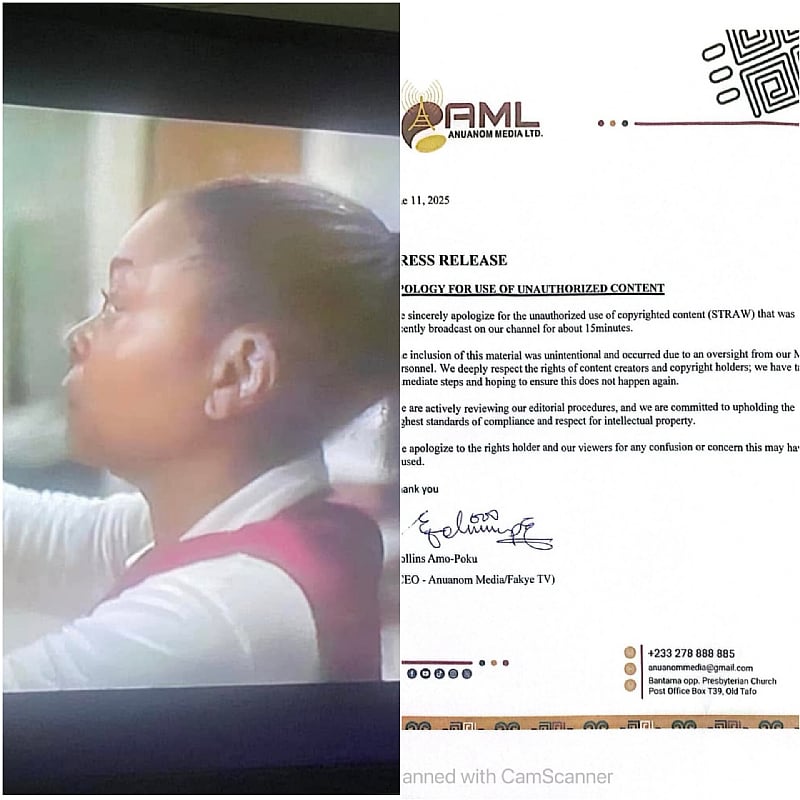The unauthorized broadcast of copyrighted material, even for a brief period, represents a significant breach of intellectual property rights and can have far-reaching consequences for all parties involved. Fakye TV’s recent airing of a segment of the movie “Straw” for approximately 15 minutes underscores the importance of robust content management procedures and the potential ramifications of oversight in a media landscape increasingly reliant on digital distribution. While Fakye TV has issued a public apology, attributing the incident to an oversight, the incident highlights systemic issues within the organization related to content acquisition, verification, and broadcast protocols. The unauthorized airing not only infringes upon the rights of the copyright holders of “Straw” but also erodes public trust in Fakye TV’s commitment to ethical broadcasting practices.
The core of Fakye TV’s apology centers on acknowledging the gravity of the situation and expressing remorse for the unauthorized broadcast. The channel recognizes the importance of respecting intellectual property rights and the potential damage to their reputation and viewer trust. This acknowledgment is a critical first step in addressing the breach, demonstrating a degree of accountability and a willingness to engage with the affected parties. Their statement emphasizes a commitment to rectifying the situation and implementing measures to prevent similar incidents from occurring in the future. However, the apology alone is insufficient to fully address the complexities of copyright infringement, and concrete actions must follow to demonstrate genuine commitment to change.
The incident exposes potential vulnerabilities in Fakye TV’s content management workflows. A thorough review of their existing procedures is essential to pinpoint the breakdown that led to the unauthorized broadcast. This review should encompass all stages of content acquisition, from initial selection and licensing verification to final broadcast approval. Implementing stricter controls and enhanced verification processes can significantly reduce the risk of future infringements. This might include establishing clear chains of responsibility for content clearance, investing in copyright management software, and providing comprehensive training to staff on intellectual property rights and compliance procedures. The review should also consider the integration of automated content identification systems that can flag potentially copyrighted material before it reaches the broadcast stage.
Beyond internal process improvements, Fakye TV needs to address the immediate impact of the infringement on the copyright holders of “Straw.” This involves engaging in direct communication with the affected parties to understand the extent of the infringement and explore appropriate remedial actions. Such actions might include financial compensation for the unauthorized use of the content, a public retraction highlighting the error, and a commitment to collaborate on future legitimate licensing agreements. Demonstrating a proactive and cooperative approach with the rights holders is crucial for rebuilding trust and mitigating potential legal repercussions. A transparent and constructive dialogue with the copyright holders can help pave the way for a mutually acceptable resolution.
The incident serves as a valuable lesson not only for Fakye TV but also for other broadcasters operating in the digital age. The rapid pace of content creation and distribution necessitates a heightened awareness of copyright law and the implementation of robust content management practices. The ease with which copyrighted material can be accessed and disseminated online underscores the need for proactive measures to prevent infringement. Broadcasters must prioritize ongoing training and education for their staff to ensure a thorough understanding of intellectual property rights and the potential consequences of unauthorized use. Investing in advanced content identification and management technologies can also play a significant role in mitigating risks and ensuring compliance.
In conclusion, Fakye TV’s unauthorized airing of “Straw” highlights the critical importance of rigorous content management procedures and the potential damage to reputation and trust that can arise from copyright infringement. While the public apology is a necessary first step, it is the subsequent actions and systemic changes implemented by the channel that will ultimately demonstrate their commitment to respecting intellectual property rights. A comprehensive review of content acquisition and broadcast protocols, enhanced training for staff, and proactive engagement with the copyright holders of “Straw” are essential for restoring confidence and preventing future infringements. This incident serves as a stark reminder of the ongoing need for vigilance and proactive measures to protect intellectual property in the digital broadcasting landscape.














